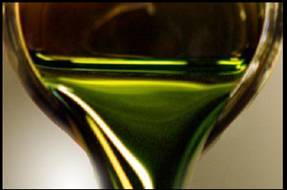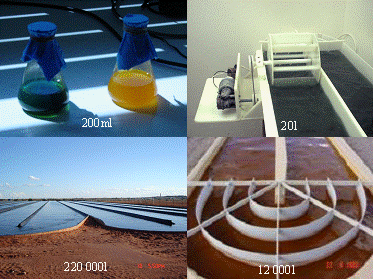South African Workshop Presentations
Two Visibility Workshops have been held on the 28 – 30 January 2010 and 2-4 March 2011 and a Partner & Training Workshop on the 15 – 22 March 2013.
2.1 Abstracts of South African Workshop (January 2010)
2.1.7 Indigenous Algae: Potential factories for biodiesel production

Presenter:
Deephyak Maharajh
CSIR
 The environmental effects of burning fossil fuels and the increased crude oil prices have triggered increased interest in biofuels. Biodiesel is traditionally produced from oil seed crops, which have low yields per land area and threaten food security. Algae have been identified as an alternate feedstock for biodiesel due to high oil yields; ~ 90 times more oil per area of land in comparison to the best oil seed crop.
The environmental effects of burning fossil fuels and the increased crude oil prices have triggered increased interest in biofuels. Biodiesel is traditionally produced from oil seed crops, which have low yields per land area and threaten food security. Algae have been identified as an alternate feedstock for biodiesel due to high oil yields; ~ 90 times more oil per area of land in comparison to the best oil seed crop.
The CSIR Biosciences Unit has commenced research in this area with the aim of implementing an algal biodiesel production technology. Lipid producing algal isolates from the United States Department of Energy - Aquatic Species Program (ASP) were obtained to benchmark technology performance. The best strains obtainable were assessed in laboratory studies, the results of which formed the basis of a techno-economic evaluation to identify key variables and parameters influencing the implementation of algal biodiesel production.
The model demonstrated a feasible business case at a basic fuel selling price of ~ R7.20, with an IRR and NPV of ~ 40% and ~ R500m respectively. The model scaled a facility to supply 10% of the mandatory biodiesel inclusion as stipulated by the Department of Minerals and energy’s biofuels strategy. The model is being applied to drive key research decisions to ensure optimal deployment of resources towards a commercially relevant outcome. The model highlighted the performance of algal strains with high lipid yield and growth rate as a key parameter.  This led to the commencement of a screening program to isolate indigenous algal strains capable of high levels of lipid production which would furthermore be suitable to exploit indigenous climatic advantages. Approximately 30% of South African environments favourable for isolating algae have been sampled. Samples were enriched, purified, and assessed for lipid content, resulting in a database of indigenous algae. Positive isolates were grown under laboratory conditions to assess growth rates, lipid productivity and yield against Cyclotella cryptica, which was the best strain available from ASP.
This led to the commencement of a screening program to isolate indigenous algal strains capable of high levels of lipid production which would furthermore be suitable to exploit indigenous climatic advantages. Approximately 30% of South African environments favourable for isolating algae have been sampled. Samples were enriched, purified, and assessed for lipid content, resulting in a database of indigenous algae. Positive isolates were grown under laboratory conditions to assess growth rates, lipid productivity and yield against Cyclotella cryptica, which was the best strain available from ASP.
 The sampling to date has yielded 50 algal isolates of which 7 show favourable lipid production. The first positive isolate was presumptively characterised as Characium spp. Initial comparisons showed that Characium spp. achieved ~70% and ~110% of the lipid concentration and productivity respectively of C. cryptica, albeit in a non-production recipe. The current research indicates strong potential for development and implementation of biodiesel production using indigenous algal isolates and has attracted significant interest from government and commercial partners.
The sampling to date has yielded 50 algal isolates of which 7 show favourable lipid production. The first positive isolate was presumptively characterised as Characium spp. Initial comparisons showed that Characium spp. achieved ~70% and ~110% of the lipid concentration and productivity respectively of C. cryptica, albeit in a non-production recipe. The current research indicates strong potential for development and implementation of biodiesel production using indigenous algal isolates and has attracted significant interest from government and commercial partners.